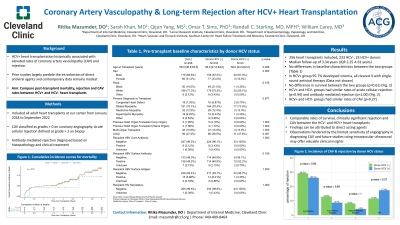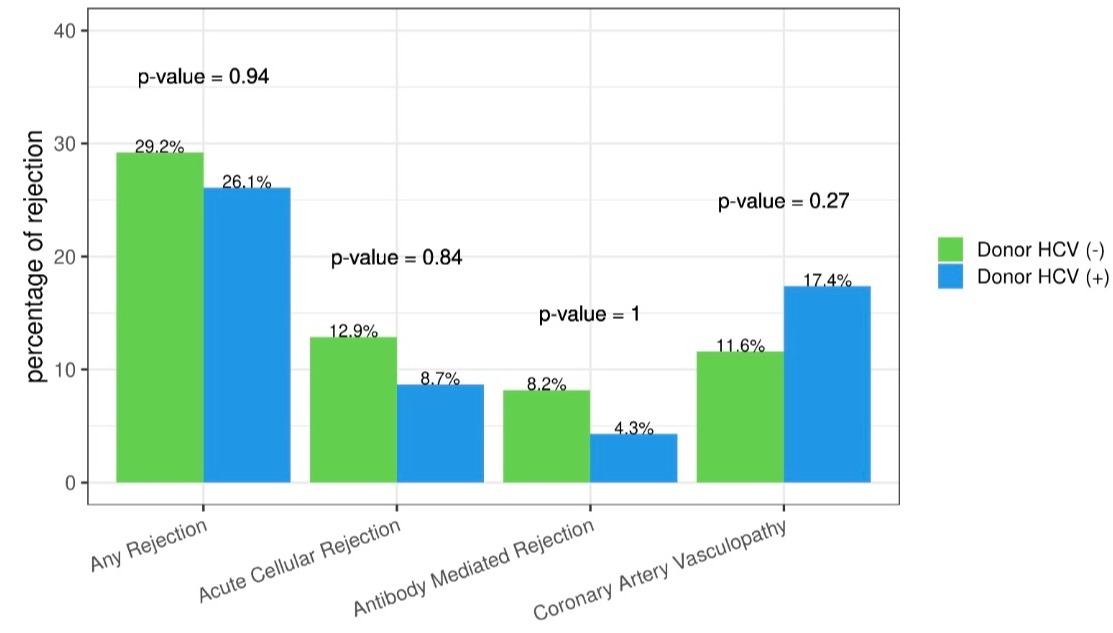Monday Poster Session
Category: Liver
P2894 - Coronary Artery Vasculopathy and Long-Term Rejection After Hepatitis C Viremic Heart Transplantation to Aviremic Recipients
Monday, October 28, 2024
10:30 AM - 4:00 PM ET
Location: Exhibit Hall E

Has Audio

Ritika Mazumder, DO
Cleveland Clinic
Cleveland, OH
Presenting Author(s)
Ritika Mazumder, DO, Sarah Khan, MD, Omar T. Sims, PhD, Randall C. Starling, MD, MPH, William Carey, MD
Cleveland Clinic, Cleveland, OH
Introduction: Historically, hepatitis C (HCV) positive heart transplantation was associated with elevated rates of rejection and coronary artery vasculopathy (CAV). However, these investigations largely predate the introduction of direct antiviral agent therapy. Despite advancements, contemporary data on the influence of HCV+ allografts on these complications remains modest. Our study aimed to compare the incidence of post-transplant rejection and CAV between recipients of HCV+ and HCV- heart transplants.
Methods: The UNOS database was queried for all heart transplants performed at our center from January 2018 to September 2022. Multiorgan transplants and pediatric patients under 18 years of age at transplantation were excluded.
Results: Total 279 heart transplants that met exclusion criteria (233 HCV- donors, 23 HCV+ donors). The recipients of HCV- and HCV+ grafts did not differ in baseline characteristics including age, sex, race, primary diagnosis, prior transplant history, LVAD usage, Hepatitis B and HIV status. The majority of HCV+ recipients developed viremia (95.7%); all cleared it with a single round of direct antiviral agent therapy. Over a median follow-up was 3.34 years (IQR 2.25-4.61 years), HCV- and HCV+ recipient groups had similar rates of post-transplant acute cellular rejection (12.9% vs 8.7%, p=0.94) and antibody mediated rejection (8.2% vs 4.3%, p=1.00) (Figure 1). The incidence of coronary artery vasculopathy was not significantly different (11.6% vs 17.4%, p=0.27).
Discussion: We observed comparable rates of clinically significant rejection and CAV between the HCV- and HCV+ heart transplant recipients. Our findings, which are at variance with previous studies showing higher incidence of CAV, can be attributed to improved HCV treatment, using pan-genotypic direct acting agents. Our observations regarding CAV may be hindered by the limited sensitivity of angiography and future studies using intravascular ultrasound may offer additional, valuable clinical insights.

Disclosures:
Ritika Mazumder, DO, Sarah Khan, MD, Omar T. Sims, PhD, Randall C. Starling, MD, MPH, William Carey, MD. P2894 - Coronary Artery Vasculopathy and Long-Term Rejection After Hepatitis C Viremic Heart Transplantation to Aviremic Recipients, ACG 2024 Annual Scientific Meeting Abstracts. Philadelphia, PA: American College of Gastroenterology.
Cleveland Clinic, Cleveland, OH
Introduction: Historically, hepatitis C (HCV) positive heart transplantation was associated with elevated rates of rejection and coronary artery vasculopathy (CAV). However, these investigations largely predate the introduction of direct antiviral agent therapy. Despite advancements, contemporary data on the influence of HCV+ allografts on these complications remains modest. Our study aimed to compare the incidence of post-transplant rejection and CAV between recipients of HCV+ and HCV- heart transplants.
Methods: The UNOS database was queried for all heart transplants performed at our center from January 2018 to September 2022. Multiorgan transplants and pediatric patients under 18 years of age at transplantation were excluded.
Results: Total 279 heart transplants that met exclusion criteria (233 HCV- donors, 23 HCV+ donors). The recipients of HCV- and HCV+ grafts did not differ in baseline characteristics including age, sex, race, primary diagnosis, prior transplant history, LVAD usage, Hepatitis B and HIV status. The majority of HCV+ recipients developed viremia (95.7%); all cleared it with a single round of direct antiviral agent therapy. Over a median follow-up was 3.34 years (IQR 2.25-4.61 years), HCV- and HCV+ recipient groups had similar rates of post-transplant acute cellular rejection (12.9% vs 8.7%, p=0.94) and antibody mediated rejection (8.2% vs 4.3%, p=1.00) (Figure 1). The incidence of coronary artery vasculopathy was not significantly different (11.6% vs 17.4%, p=0.27).
Discussion: We observed comparable rates of clinically significant rejection and CAV between the HCV- and HCV+ heart transplant recipients. Our findings, which are at variance with previous studies showing higher incidence of CAV, can be attributed to improved HCV treatment, using pan-genotypic direct acting agents. Our observations regarding CAV may be hindered by the limited sensitivity of angiography and future studies using intravascular ultrasound may offer additional, valuable clinical insights.

Figure: Figure 1. Incidence of rejection and coronary artery vasculopathy by donor HCV status
Disclosures:
Ritika Mazumder indicated no relevant financial relationships.
Sarah Khan indicated no relevant financial relationships.
Omar Sims indicated no relevant financial relationships.
Randall Starling indicated no relevant financial relationships.
William Carey indicated no relevant financial relationships.
Ritika Mazumder, DO, Sarah Khan, MD, Omar T. Sims, PhD, Randall C. Starling, MD, MPH, William Carey, MD. P2894 - Coronary Artery Vasculopathy and Long-Term Rejection After Hepatitis C Viremic Heart Transplantation to Aviremic Recipients, ACG 2024 Annual Scientific Meeting Abstracts. Philadelphia, PA: American College of Gastroenterology.

